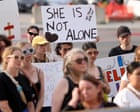
In recent weeks, various events around the globe have unfolded, offering insights into the progress and challenges in crucial areas such as justice, human rights, and gender equality. These stories, each carrying its own unique context and significance, highlight the ongoing dialogue and the necessity for reflection and adaptability in addressing societal issues.
In Canada, the conclusion of a high-profile sexual assault trial has sparked a conversation not only about the justice system but also about the ingrained cultural norms within major professional sports. While the accused hockey players were acquitted, public discourse remained active, centering on the perceived imbalance in scrutiny faced by the female accuser compared to the defendants. The trial served as a lens through which discussions on the nature of consent and power dynamics in sports environments were amplified, urging a reevaluation of how such cases are approached in the broader societal context.
Meanwhile, in El Salvador, the management and funding of detention facilities have come under scrutiny. Congresswoman Delia Ramirez, citing concerns over potential human rights abuses, has called for a congressional hearing to investigate the use of federal funds in these facilities, especially regarding the treatment of migrants. This development has underscored the delicate balance between immigration policy and human rights obligations, emphasizing the need for transparency and accountability in international agreements and operations.
Turning to New Zealand, a discussion on electoral reform has highlighted the potential impacts of legal changes on voter inclusivity. Prime Minister Christopher Luxon’s proposed reforms, aimed at modernizing electoral processes, have prompted warnings from the attorney general about possible breaches of human rights laws and the disenfranchisement of significant voter groups, particularly the Māori community. This situation has brought to the fore the importance of ensuring that electoral systems provide equitable access and representation for all citizens.
In Australia, findings from a Victorian coroner have spotlighted the critical need for effective family violence interventions. The coroner emphasized the importance of timely support for individuals using violence to prevent tragic outcomes. This insight reflects a broader understanding of the complex nature of family violence and the urgent need for comprehensive support systems that address both prevention and intervention.
Gender equality in professional settings was brought into conversation by Australian Liberal MP Terry Young’s comments regarding gender quotas. Young’s remarks about the natural career tendencies of men and women sparked debate about the role of policy in achieving gender equity. This discussion mirrors ongoing global conversations about the socio-cultural factors that influence career choices and the structural adjustments needed to support gender diversity and inclusion.
Each of these stories, while distinct in their details, collectively highlight the evolving landscape of societal norms and the ongoing efforts to foster justice, equity, and human rights. They remind us of the importance of maintaining a mindful approach as we navigate the complexities of these global issues, embracing a spirit of continuous reflection and adaptation to honor and protect the rights and dignity of all individuals.
Source: {link}
